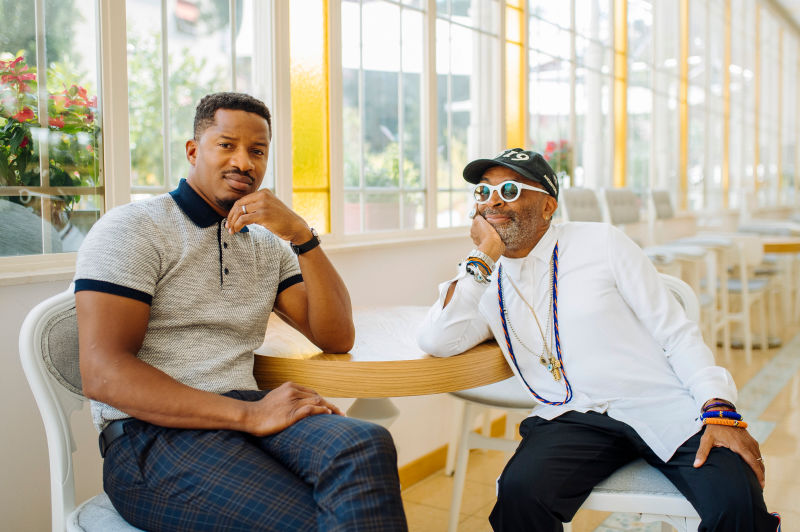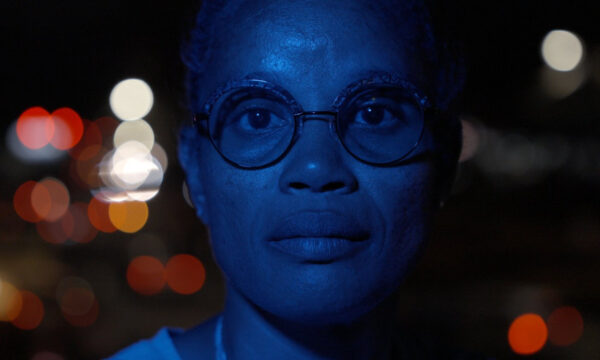American Skin press conference: Spike Lee, Nate Parker and Tarak Ben Ammar discuss faith, forgiveness and the “free world” at Venice Film Festival 2019

Presented in the Sconfini section of the 76th edition of the Venice Film Festival, American Skin is the latest film from writer-director Nate Parker, which confronts police violence and systemic racism in America today.
Denied of a fair trial following the shooting death of his teenage son by a white police officer, a black Iraqi war veteran seeks justice. American Skin weaves a layered story in the tradition of Sidney Lumet’s 12 Angry Men and Dog Day Afternoon. This is the press conference held in Venice with the support of legendary director Spike Lee.
Nate Parker: First I want to recognise the people, the reason we are here, their beliefs, support – both financial and emotional: Tarak Ben Ammar and Mark Burg.
Can you tell us about the last three years?
NP: Thank you for that question. The last three years have been such a learning experience for me. So much wisdom gained from people. The reality is, three years ago I was pretty tone-deaf to the reality of certain situations in the current climate. Being tone-deaf, there were a lot of people who were hurt by my approach, so I apologise to those people. I’m so glad to be in Venice with a film I so desperately believe in. I’m an artist, like Nina Simone says, artists should reflect reality, and we live in a very dark time. To be able to be making films, for my people, is very humbling. Thanks for watching the film and taking the time. I’m 39 now and I continue to learn, I hope I have a long way to go.
Spike Lee: I would like to say, Nate called me up. We haven’t talked for a while. He says, “Spike I got a film, I want to show it to you”. So Nate showed me this film and I said, “don’t tell me what it is, I just want to see it”. I haven’t been moved by a film like this in many many years. I said to Nate, “whatever you want me to do, I’ll do it.” Because for what happened in the past, Nate and I had a real man to man, brother to brother talk, private, between us. He explained to me, the growth and pain he’s been through, what he learned. And he said: come on brother, what to do we do? And that’s why I’m here.
Did you give any advice or change strategy or goals after your talk?
SL: Nate is a writer, director and actor of this film. The film was done when I saw it. This is his film. I never tried to be like, “you need to do this this this”.
I’ve read that you are Christian. How can religion help with this racial conflict?
NP: Yes it is true. From what I understand from the question, you are asking how can faith be instrumental in this conversation. I can only speak about my relationship with faith. Faith not only inspired the way I approach my art but also the man I’m inspired to be. I respect the time in a way that I believe gives hope for the future. I’m not living for solely my moment; I try to create change, global change, for my five daughters, so that they can have inherited a better world. The core of this understanding comes from faith, that I’ve been put here for a very specific reason and the art is the tool. My faith has been extremely influential in the way I’m a husband to my wife, the way I father my children. Like the bible says, I’m trying to do in my life.
Tarak Ben Ammar: I didn’t expect this faith question. Because on this table we have a Jewish producer, a Muslim producer and a Christian director. Nate Parker, I went to visit him two years ago, because I watched a masterpiece: Birth of a Nation. I started my career with Rossellini, Rose, Zefirelli. So I wondered: how come we Europeans do not know him? I watched it on DVD. I was young in the 60s in America so I saw the BlacKkKlansman movement as a North African. So I identified with them. And I felt the sufferance of 400 years ago, slaves were bought, they didn’t migrate. So I thought: this director is at the level of Jean Jacques Annaud, Spielberg. There’s nothing better than to find a great, talented director who doesn’t have the possibilities. Being a black man, he didn’t get the same opportunities. Son of a tarot Tunisinian, with not much money, I felt that weight and I wanted to make a film with him. He told me the story. I went away, I had another film. Then he called me back and I said: let’s do it. What matters is the talent, who made it, what producers, who cares. He opened our mind and heart.
Mark Burg: I made the movie because the story needed to be told. Our country has a president who is dividing the country rather than unifying it. I also want to say I love Italy, I’m here, but I also love my country, which has a judicial system that I believe in. I believe in the police, and believe that we need to have a dialogue, and start a process so that our country can start to heal without fighting and killing each other. There’s not a week that goes by without reading about a racial incident, with no reason. And that’s why I have to make the film.
Spike, you talked about racism and now you are supporting a director who faces the same issues. Are you optimistic about US society? Is this period of time more dramatic than before?
SL: The former president of the US, Barak Hussein Obama. He himself said this upcoming presidential election would be the most important in the history of USA. She’s fucked up. It’s the same with this guy, I don’t call him by his name. Agent Orange. Busta Rhymes came up with it. My optimism is that people registered to vote, because this guy has to go. It’s that serious. He’s done many evil things. But one thing that really struck me, the imagery of young infants being torn away from the arms of the screaming mothers. They didn’t do anything to bring back the separated families. How do you do that? That’s where we are. Where infants are snapped from their mother’s arms, who are flown I don’t know how many miles away and put in cages. The supposed cradle of democracy. The president should be the leader of the free world. He tries to free nobody. He put people in cages. That’s where we are.
Why start from a rebellion in your second film as well as your first?
NP: I feel there’s an urgency that is happening specifically in the USA. It’s not so different from what happens globally. We shouldn’t limit the possibility of having conversations in our homes, we need to activate and galvanise people who are brilliant in their profession to join the conversation. We shot in in April, now we are here. I spoke with Tarak and Mark about getting the message out to save lives. That’s the power of cinema, creating discussion to save lives. If it succeeds in its goal of keeping the breath inside a young, child or old person, at least one – black, hispanic or white – then it’s the most important film that I’ve ever done. This was our goal. We want to circulate this, and with Spike to show it to police departments in Brooklyn, New York, Philadelphia, the areas where problems are more. The trainers. Use data and behaviour of that data to be influenced by a film. And we may not even see the life that’s saved, but we can change police training so they can introduce it to law enforcement. We couldn’t know what Mike Brown would have gone on to do, maybe he would have cured diseases or given speeches. We didn’t have a high budget so didn’t have money to pay the costs and nobody got what they deserved. But they all understand the goal. I made this film because there’s a sense of desperation in bringing the factions together. The film’s about finding a way to reinstil human dignity to our people. There’s no better time than to get the message out now.
Laura Denti
Photo: Courtesy of Eagle Pictures
American Skin does not have a UK release date yet.
Read more reviews from our Venice Film Festival 2019 coverage here.
For further information about the event visit the Venice Film Festival website here.

























Facebook
Twitter
Instagram
YouTube
RSS